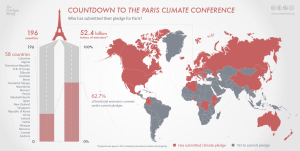7 September 2015, The Carbon Brief, Bonn climate talks ask for draft Paris text. A draft international climate agreement package will be published within weeks, setting the scene for crunch UN talks in Paris in December. During negotiations in Bonn last week, countries made progress on some key sticking points and started to lay out the skeleton of the planned agreement. Yet with just five more days of formal negotiations before Paris, disagreement over many details remains profound. The co-chairs of the process will now attempt to cement progress and bridge those divides. They have been given a mandate to prepare a draft agreement by the first week of October. Parties will then start line-by-line negotiations on the draft text when they return to Bonn on 19 October. Carbon Brief summarises events in Bonn last week and rounds up reactions to the latest talks. Read More here
Monthly Archives: September 2015
7 September 2015, Climate News Network, Climate talks are stuck in the slow lane to Paris. Lack of progress at the close of “unbearably tardy” negotiations in Bonn undermines hopes of a meaningful deal being agreed at this year’s crucial UN climate summit. The latest round of climate talks in the German city of Bonnhave ended with a failure to deliver common grounds for the negotiations at the UN climate summit in Paris at the end of this year. The Paris talks, involving all UN member states, are meant to deliver a draft that could lead to a new world climate treaty to replace the expired Kyoto Protocol. But experts now fear that there will not be enough time left to see a major breakthrough. Jan Kowalzig, climate change policy adviser at Oxfam, described last week’s negotiations in Bonn as “unbearably tardy”. He said: “If the negotiators keep up that slow pace, the ministers at the UN summit will get an unfinished paper that they will have to resolve with no time for reflection. The outcome will then most likely be an extremely weak new treaty that will not save the world from climate change.” Read More here
7 September 2015, The Carbon Brief, Paris 2015: Tracking country climate pledges. 31 March marked the loose deadline for countries to submit their pledges to the UN on how far they intend to reduce their greenhouse gas emissions. These promises, known as “intended nationally determined contributions”, or INDCs, will determine the success of the deal that the UN hopes to sign off in Paris in December this year. While only five countries plus the EU made the deadline, more than a hundred others are expected to filter in throughout the coming eight months. Carbon Brief is tracking the pledges made by each country. We’ll update this post as each INDC comes in. To find out exactly what an INDC is and why it matters, read our INDC explainer. Read More here
7 September 2015, The Conversation, Restoring and conserving nature in the Anthropocene means changing our idea of success. The Earth has unofficially entered a new epoch – the Anthropocene. It suggests that humans are the dominant influence on the planet’s ecosystems and biosphere – the sum total of life and non-living material on Earth. Many ecosystems have changed so radically that it is no longer possible to restore them to what they once were, and in other situations it is not appropriate. Instead we need to look at what we can change, accept the things we can’t, and recognise that humans are now an important part of nature. Restore, reclaim, reintroduce? Accepting humans as part of nature will require a shift away from traditional views of restoration and conservation. Governments and communities worldwide spend enormous sums of money and countless hours of work on restoration projects, aiming to reverse the degradation that we have wrought over the past few centuries. The United Nations, for example, has agreed to a target of restoring 150 million hectares of land by 2020, costing about US$18 billion each year. In Australia, federal and state governments have several very large restoration programs targeting, in one case, the Murray-Darling Basin – to protect and restore the degraded flowing waters and wetlands of our most iconic river system – and, in another, the Great Barrier Reef – to maintain and restore the universal value of our most iconic marine ecosystem. There is an elephant in the room. In most cases, restoration efforts aim to return ecosystems to a state closer to what they looked like in the past and how they functioned before modern society. This target is often termed an “historical baseline” . Read More here

